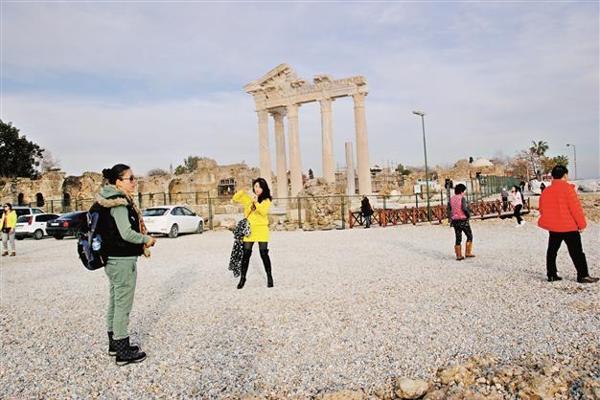Antalya's ruins drawing in Chinese tourists
ANTALYA – Doğan News Agency


The 12-day Anatolian tours start in the ancient city of Ephesus, usually ending in Antalya’s ancient city of Selge.
Chinese tourists are heading in increasing numbers to the southern province of Antalya after Istanbul and İzmir for ecological, cultural, historical and archaeology tours. Approximately 195,000 Chinese tourists have taken part in recent years in 12-day Anatolian tours to see the traces of various civilizations. The tours start in the ancient city of Ephesus and end in Antalya’s ancient city of Selge.After Ephesus, the second most popular ancient city among Chinese tourists is Side, according to tourism officials. The tour also includes Antalya’s Myra, Seleukeia, Selge, Termessos, Kekova (Sunken City), Tlos, Patara Meclisi, Side, Perge, the ancient theater of Side, Alanya Castle, the Lycia Rock Tombs, Xanthos, Letoon, the ancient theater of Aspendos, Belkıs Bridge, Athena and Apollon.
Chinese tourist guide and cultural tourism expert Yarkın Teslina said that unlike Europeans, Russians and Scandinavians, Chinese tourists were not interested in sea, sand and sun tourism, noting that 98 percent of visitors from China wanted to know about cultural heritage artifacts.
Twelve-day Anatolian tours
“We bring foreign guests from Beijing to Istanbul and send them on nine- or 12-day Anatolia tours. In recent years, Antalya follows İzmir for Chinese tourists in culture and archaeology tours. The fact that Antalya is home to many ancient cities is an advantage for them. Because they want to learn about culture and history during their holiday, they like to listen to stories of past civilizations a lot. We take Chinese tourists to 24 ancient sites in Antalya. Last year, we received 54,000 Chinese tourists. Our goal is to increase it to 80,000. They have special interest in Xanthos which is under UNESCO protection.”
Chinese archaeologist Dr. Lee Yun said they took tourists to the ancient city of Ephesus in İzmir first and then Antalya. After Italy, Yun said, Turkey is the second country for Chinese archaeology tourists.
“Antalya is very important to Chinese tourists. It is like an open-air museum for them. The 12-day tour starts in Istanbul and ends in Side. Antalya will become more [popular] for Chinese tourists in the next years,” Yun said.
China-Turkey Friendship Group Chair Jasmine Le said the promotion of Anatolian civilization by the Turkish Culture and Tourism Ministry had been instrumental in drawing Chinese tourists to Turkey. Le said Deputy Culture and Tourism Minister Abdurrahman Arıcı had expended great efforts to promote ancient sites in Antalya. “Our goal is to draw 100,000 Chinese tourists to Turkey by the end of 2015. I believe that we will easily reach it thanks to promotions.”
